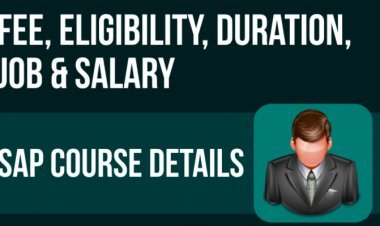Courses After MBA | Courses After MBA Details, Job Oppurtunities, Salary
iim courses after mba-professional courses after mba - finance job oriented courses after mba- marketing courses after mba , marketing continuing education after mba, certificate course after mba in india phd after mba, job oriented courses after mba hr

Courses After MBA: Thinking What To Do After an MBA? Here Are The Best Courses for You. Procuring an MBA degree is a really proud moment for anybody. But as they say ‘the sky’s the limit,’ thus at times, a student feels unsatisfied even after the completion of the course. There are numerous courses to opt for even after an MBA which many are aware of. Today, we will discuss a few prime courses after MBA for a bright and successful career.
What Are Some Popular Courses after MBA?
- SAP Course
- HR Practical Course
- Digital Marketing Course

SAP Course
SAP usually stands for Systems, Applications, and Products in Data Processing. It typically combines instruction in human resource software management, database management, and business training. You can also get SAP certification as part of a degree or as a stand-alone course. SAP is famous for its enterprise resource planning and data management programs.
Students trained in the SAP course can create an information warehouse, design an input screen, and access data tables. Many programs can be associated with this software but SAP ERP is widely popular among them all.
SAP COURSE DETAILS :
| Course | SAP |
| Full-Form of SAP Software | System Applications and Products in Data Processing |
| Eligibility & Requirement | Graduate or Masters Degree |
| SAP Course Duration | 45-60 Days |
| SAP Course Fees | 08957990909, 09565818207 |
| SAP Starting Salary Offered | 3 – 5 Lakhs |
| SAP Similar Course | Tally |
| SAP Employment Opportunities | Senior Account Executive, System Engineer, Application Programmer, Software Engineer |
| SAP Course Contact No. | 08957990909, 08960175569 |
HR Practical Course
HR has one of the most challenging and rewarding job profiles in any professional organization, which is why many candidates and pursue a career in the field. There are many other reasons which will tell you about HR which are as follows:
- It is one of the highest-paid jobs in any professional organization where candidates can earn higher incomes than their peers which is one of the most obvious reasons for learning HR.
- You will be in a situation where you can influence employees by providing training and development, identifying the need to improve employees, resolving their issues, and presenting them with a safe and secure work environment that is Can make a difference in productivity and performance. Of the workplace.
- There are many other job profiles that you can do even after acquiring skills in HR Generalist including HR Assistant, HR Administrator, Training Officer, HR Officer, HR Manager, Recruitment Coordinator, etc., all of whom are highly paid and important jobs. Are in the profile. A big enterprise.
- You will work with a large group of people with incredible skills and expertise that will allow you to learn more in your career and gain many growth opportunities.
- The scope of the HR Training Course is incredibly bright in the current commercial market as they are able to demonstrate a large set of fluent business. This will help them enjoy job security.
- As an HR, you have to gain respect and recognition from employees and your employer which in itself is a benefit.
HR TRAINING COURSE OBJECTIVE:
- Strong formation of fundamental concepts in human resources and its departments
- Understanding the roles and responsibilities of a HR professional
- Know the recruitment processes: screening, shortlisting, interview scheduling, job analysis, and posting
- Understand the concepts and modes of staff management, payroll, and employee hiring
- Orientation in Competence, Epping, Performance Management Systems, Policy Formation, and Swot Analysis
- Know labor laws and understand the need
- Compliance and OH & S
- A special module on the interview:
- How to prepare a professional resume
- Learn to conduct an interview
- Know how to face the interview
- Must be sufficiently competent to prepare interview questions
- Know how to handle and manage a GD session
- Learning HR Analytics and Generalist about HR
- Improving interview skills, soft and communication skills as well
- Module 1 – HR Generalist & Legal Compliance
- Module 2 – Recruitment & Selections
- Module 3 – Training & Development
- Module 4 – Organizational Development
- Module 5 – HR Policy
- Module 6 – Business HR,
- Module 7 – ESI Act & PF Act
- Module 8 – Disciplinary Action/Termination/Misconduct
- Module 9 – Factory Act
- Module 10 – Contract Labour (Regulation And Abolition)
- Module 11 – Payroll Processing
- Module 12 – Special Hr Interview Guidance Program
- Module 13 – Interview’s Session
Digital Marketing Course
| COURSE | DIGITAL MARKETING / ADVANCE DIGITAL MARKETING |
| Digital Marketing Course Eligibility | 10th, 12th, Graduate or Masters Degree/Fresher/Exp./Business Owner/Housewives - Anyone can join |
| Digital Marketing Course Duration | 45-180 Days |
| Digital Marketing Fees | 15 – 35 Thousand |
| Digital Marketing Starting Salary Offered | 3 – 5 Lakhs |
| Digital Marketing Course | 100% Real Time / Live Projects |
| Digital Marketing Job Profiles | Digital Marketing Managers. SEO managers. SEM/PPC experts. Social media managers. Affiliate marketing leaders. Content marketers. And much more |
| Digital Marketing Course Contact No. | 08957990909, 08960175569 |
FAQ’s On Courses After MBA
Question 1.
What are some of the courses I can opt for after an MBA?
Answer:
For a bright future, one can continue studying for different specializations such as Human Resource, Finance, Marketing, Business Management, Business Analysis, etc.
Question 2.
How can courses after MBA help in my career?
Answer:
The courses offered can provide an advanced skill set specific to the field.
Question 3.
Where can I find the best jobs after MBA?
Answer:
You can find the best jobs in banks, insurance companies, corporations, universities, research departments, security firms and financial organizations.

 Dr. Pratibha
Dr. Pratibha 







![Top 10 Best Digital Marketing Courses Institute in India – 2022 [Updated]](https://trainwick.com/blogs/uploads/images/2021/12/image_380x226_61b5ea624f712.jpg)







